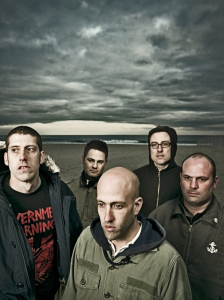 In 1995, a growing indie record label from Wilmington, Delaware released Lifetime’s second record, Hello Bastards. The record quickly rose to iconic stature.
In 1995, a growing indie record label from Wilmington, Delaware released Lifetime’s second record, Hello Bastards. The record quickly rose to iconic stature.
Everything about the record – the green-tinted photographs, the road map graphics, the On the Waterfront samples, the uncommon vocals and delivery by Ari Katz, and the slightly reserved mosh breakdowns (something unheard of in those times) – was mimicked and studied by legions of punk fans.
Katz rose to mahatma status, his punk wisdom bordered on saintliness, and his actions were discussed as legend. Embarrassingly, it took a band like Lifetime to introduce the punk scene to Weezer’s then recently released Blue Album, something the ’90s punk rockers discreetly sneaked into their collections and then became frantically obsessed with.
Like many influential musicians, Lifetime seemed to call it quits too early. The 1997 release of Jersey’s Best Dancers was met with expected zeal and an unexpected break-up. The dissolved band was under the entire scene’s scrutiny. Widespread disappointment in Lifetime was tamed slightly by the formation of two new groups, Zero Zero and Kid Dynamite.
In the seven years that Lifetime was active, they completely invigorated the small yet evolving punk scene. Now, Lifetime is back and primed to release a long-awaited follow-up record on Fall Out Boy bassist Pete Wentz’s label, Decaydance (alongside Panic! at the Disco). ALARM spoke with guitarist Peter Martin about the reunion, the album, and the band’s future.
What is it like to be opening shows for Fall Out Boy?
It’s pretty weird. It’s a little surreal. It’s them and New Found Glory, and they’re like, “You guys are the biggest influence on us!” We’re like, “Really?”
How does it feel to have so many younger bands always telling you how much you influenced them?
It never gets uninteresting. We’re still trying to figure out how they took the influence and applied it to their own band. It’s not always readily apparent. We played – and we still play – fast hardcore that’s melodic. It’s super flattering, though.
How did Pete Wentz convince you to sign to Decaydance?
He saw us play like ten years ago at the Fireside Bowl in Chicago, and the legend goes that it was one of the first punk rock shows he ever saw and after seeing us play he wanted to start a band and knew what to do with his life.
Here he is today, really successful, and he comes back and says, “Lifetime is my favorite band, I want to give you whatever you want.” Basically, he said, “Whatever you want to do, I’ll support you,” and you can’t punch a lot of holes in that. He’s been great.
“Did we make a mistake? Are our old fans going to ditch us?” – Lifetime guitarist Peter Martin
What about the fans that have called you sell-outs for signing with Pete?
It’s a real knee-jerk reaction, we think. We’re trying to do our thing and Fueled By Ramen is a reputable label with reputable bands on it. But I can see how you’d see Fall Out Boy on MTV and think, “Where does Lifetime fit in with that? How does that work?”
At the end of the day, it was like these guys are really honest and super sincere and they’re going to let us do what we want to do. That won out. It’s not easy because in the back of your head it’s like, “Did we make a mistake? Are our old fans going to ditch us?”
[The new record] sounds like Lifetime. I think a lot of kids are afraid we’re going to sound like Fall Out Boy or Panic! at the Disco.
When did you start writing the record?
Two years ago. We didn’t really know what we were going to do, whether it was going to come out on Jade Tree again or what. We figured we’d get the writing process going again, but most of that didn’t make it. So really we pulled together all the songs in probably six months, which is hyper-speed for us. It was actually pretty amazing we pulled it off. I’ve never been more excited about a recording. It’s everything I could have hoped for for the next Lifetime record.
Was it difficult to get back into the groove of working with these guys when you started playing together again?
We were a band for the better part of seven years, day in and day out. It sort of becomes part of your DNA at that point. I hadn’t talked to some of these guys for almost five or six years, but you get in a room together and there are a couple funny notes here and there, but it came together really fast.
Why did you decide to self-title the new album?
We went back and forth. We knew that whatever we would call it, it would just go under a microscope, and we’re under the microscope as it is. Having it be self-titled is a cop-out and of course everybody’s already calling us out on it. We came up with some titles, trying to see who could poke holes in what, and decided that less is more is the way to go.
Were there any major challenges you encountered while making the record after being away from the band for so long?
Not being too self-conscious, because we were trying to filter all this pressure and everyone looking at us in a bigger spotlight than we’ve ever been in before. We feel like people have really great expectations. There’s a lot of people waiting to see what we’re going to sound like. So not letting that pressure get to us while we were writing the record.
